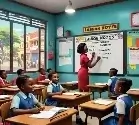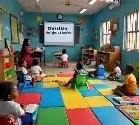Understanding Vocational Education for Primary 1
Vocational Education
Lesson Plan for Primary 1 – First Term – Week 1
Subject: Vocational Aptitude
Class: Primary 1
Term: First Term
Week: 1
Age: 6 years
Topic: Vocational Education
Sub-topic: Introduction to Vocations
Duration: 40 minutes
Behavioural Objectives
By the end of the lesson, pupils should be able to:
- Define vocational education in simple terms.
- Differentiate between a job, career, and vocation.
- List at least five vocations and their professionals.
Keywords
- Vocation: A job or career.
- Skill: Ability to do a task well.
- Career: A long-term job someone does.
- Job: Work one is paid for.
Set Induction
The teacher begins by asking pupils what they want to be when they grow up (e.g., doctor, teacher, or tailor). The teacher then explains that these are called “vocations.”
Entry Behaviour
Pupils are familiar with people who work, like teachers, nurses, or tailors.
Learning Resources and Materials
- Picture cards of different vocations (e.g., teacher, nurse, tailor).
- Flashcards with the names of professions.
Building Background / Connection to Prior Knowledge
Ask pupils to mention jobs they know and discuss the people who do them.
Embedded Core Skills
- Listening and speaking skills.
- Observation and categorization.
Learning Materials
- Lagos State Scheme of Work for Vocational Aptitude.
Instructional Materials
- Flashcards, picture charts, and relevant textbooks.
Content
Definition of Vocational Education
- Vocational Education is a type of education that helps one gain knowledge or skill to prepare for a specific job or career.
Definition of Key Terms
- Vocation: A job or career.
- Skill: The ability to do something well.
- Career: A long-term job someone does for a living.
- Job: A task or work that someone is paid to do.
Examples of Vocations and Their Professionals
- Vocation: Teaching | Professional: Teacher
- Vocation: Nursing | Professional: Nurse
- Vocation: Tailoring | Professional: Tailor
- Vocation: Plumbing | Professional: Plumber
- Vocation: Shoe-making | Professional: Shoemaker
- Vocation: Barbing | Professional: Barber
Evaluation (Fill-in-the-Blank Questions)
- A ___ is a task or work that you are paid for.
a. Job
b. Career
c. Skill
d. Vocation - ___ is the ability to do something very well.
a. Job
b. Career
c. Skill
d. Vocation - A ___ works as a nurse.
a. Teacher
b. Tailor
c. Nurse
d. Barber - ___ is the profession of making clothes.
a. Plumbing
b. Tailoring
c. Barbing
d. Teaching - A person who cuts hair is called a ___.
a. Tailor
b. Nurse
c. Teacher
d. Barber - A ___ repairs pipes and water systems.
a. Plumber
b. Teacher
c. Barber
d. Shoemaker - A ___ makes shoes for people.
a. Barber
b. Teacher
c. Tailor
d. Shoemaker - ___ is a type of education that prepares people for jobs.
a. Skill education
b. Academic education
c. Vocational education
d. Physical education - A ___ works in a hospital or clinic taking care of patients.
a. Tailor
b. Nurse
c. Barber
d. Plumber - A ___ sews clothes for people.
a. Teacher
b. Tailor
c. Nurse
d. Shoemaker - A ___ helps pupils learn in school.
a. Teacher
b. Tailor
c. Plumber
d. Nurse - Vocational education helps people gain ___.
a. Houses
b. Cars
c. Skills
d. Certificates - ___ is someone who builds a career over time.
a. Doctor
b. Professional
c. Plumber
d. Barber - Tailoring is an example of ___.
a. A career
b. A job
c. A vocation
d. A sport - A ___ is someone who cuts and styles hair.
a. Tailor
b. Barber
c. Teacher
d. Nurse
Class Activity Discussion (15 FAQs with Answers)
- What is a vocation?
- A vocation is a job or career.
- What is vocational education?
- It is education that helps people learn skills for specific jobs.
- What is a skill?
- A skill is the ability to do something well.
- What is a career?
- A career is a long-term job.
- What is a job?
- A job is a task or work for which someone is paid.
- Who teaches in schools?
- A teacher.
- Who cares for sick people?
- A nurse.
- Who makes clothes?
- A tailor.
- Who repairs pipes?
- A plumber.
- Who makes shoes?
- A shoemaker.
- Who cuts hair?
- A barber.
- Can skills be learned?
- Yes, through education and experience.
- Is being a teacher a vocation?
- Yes.
- Is vocational education important?
- Yes, it helps people gain skills.
- Can you name another profession?
- Example: Doctor.
Presentation
Step 1: The teacher revises the previous topic on “Good Manners.”
Step 2: The teacher introduces the new topic: Vocational Education. The teacher explains that vocational education helps one gain skills to work in specific jobs like teaching, nursing, or tailoring.
Step 3: The teacher allows pupils to mention different jobs they know. The teacher corrects them when necessary.
Teacher’s Activities
- Display pictures of different vocations and professionals.
- Guide pupils in differentiating between a job, skill, and career.
Learners’ Activities
- Pupils will identify and name different vocations and the professionals who do them.
- Pupils will participate in discussions about the importance of vocational education.
Assessment (Evaluation Questions)
- What is vocational education?
- What is a vocation?
- Give two examples of vocations.
- Who works as a nurse?
- What is a career?
- Who makes clothes?
- What does a shoemaker do?
- Who repairs pipes?
- What is the difference between a job and a career?
- Can skills be learned through experience?
Conclusion
The teacher goes around the class, marks pupils’ work, and gives feedback on their understanding of vocational education.
More Useful Links
- Vocational Aptitude Primary Examination Primary 4 Third Term Lesson
- FIRST TERM EXAMINATION CLASS PRIMARY 1 Vocational Aptitude
- What is Vocational Education

